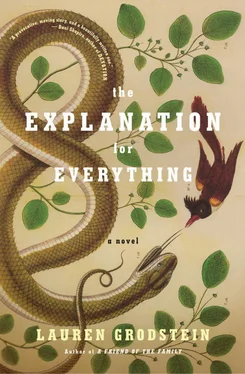(Incidentally, McGee, I know I mentioned this to you in a previous letter, but it bears repeating that my drunks have a detectably lower level of neuropeptide Y in their brains, which has, I believe, increased their tendency toward alcoholism. Perhaps this neuropeptide factor will be manipulated medically one day to some pharma’s great profit. Unfortunately that day will be too late for you, McGee, and of course too late for me.)
The girls are still asleep, thank goodness—lately Belle’s been having nightmares and insisting I sleep next to her, or, worse, climbing into Rachel’s bed and then both of them are groggy and annoyed the next day. As I’ve mentioned to you many times, it’s not easy being a single father, but the task seems infinitely harder when the girls are sniping at each other over issues of purloined sweatshirts and ugly hairdos, which is what they do when they’re overtired. Belle seems unable tell me what her nightmares are about. She is usually very articulate and so naturally this has me worried, as do the nightmares.
But they remain asleep for the moment, and I can hear the crickets going outside. It still stuns me that this is where I live and that Lou has never seen this house.
A neighbor told me she spied a black bear rooting through her garbage the other day, which made me think I better start buying tighter lids for our garbage cans, maybe even one of those steel cages. This was another thing I never had to worry about in Florida. But it’s almost autumn again, and that’s when the animals get hungry. What would I do if I saw a bear, McGee? Would I have the guts to shoot?
(McGee, rest easy: I don’t even own a gun).
Another way I can measure how time passes—seven years already—is that Rachel has started looking so much like Lou did in her twenties. Her hair is getting a little darker, like Lou’s was, and sometimes she makes these faces—when she’s confused, she narrows her eyes just like her mother did. I’ve been looking at pictures, just to see. I have some pictures where Rachel could be Lou’s little sister. It’s creepy, or perhaps it’s just genetics.
Anyway, right now I need some coffee, and then I suppose I should start prepping next week’s classes. I have dry cleaning to pick up. And your parole hearing is this January. I haven’t booked my tickets, but my mother has agreed to come watch the girls while I’m away, which is a start.
In the meantime, I remain,
Your faithful correspondent,
Andy Waite
Later that afternoon, Sheila’s. On the way home from work he bought three sunflowers at a farm stand, gave them to Belle to hand to Sheila. “These are lovely!” she said, standing at the doorway to welcome them. “Thank you, Belle.”
“It was my father’s idea,” Belle said, then followed Rachel who followed Jeremy to the rec room, where the PlayStation was.
“Thank you, Andy,” Sheila said, giving him what he recognized as her flirtiest smile. She led him into the kitchen, where the late afternoon sun lasered through the windows, yet Andy’s fingers—his whole body—felt cold.
“Hey, could you do me a favor?” she asked, reaching across the stained linoleum countertop for a paper bag. She held it out to him as though it contained a child’s lunch or shoes to go in for repair. “They’ve got to be boiled alive.”
“What has to be boiled alive?”
She held the bag open for a moment so Andy could peek inside: two lobsters, alive and kicking, furious about their predicament.
“It’s silly, but it’s hard for me,” she said, wiping her hands on her stained canvas apron. “I was hoping you could.”
Andy took a half step backward, listening to the scrabble-scrabble-scrabble of the bagged lobsters, and to the sound, in the distant living room, of his daughters playing something violent on her son’s PlayStation. Sheila pushed her heat-frizzled bangs off her face. Again, her flirty smile.
Here it was, he thought. Obligation. “Ah,” he said. “Well.”
Sheila’s house was beautiful, the nicest one on the block, a Victorian whose upkeep she couldn’t quite manage. An overgrown lawn, a loose board in the front porch, that sort of thing. But her kitchen, despite the disarray, was haphazardly inviting, potted herbs on the windowsill by the sink, a worn-out block of knives. In general, Andy liked being there. When she invited his family for dinner he was usually at least halfway grateful. But now, with the heat, and the scrabbling lobsters—and he was almost certain his daughters were playing a game where they mowed each other down with machine gun—he felt dizzy and uncharacteristically out of words.
“It just takes a second,” she said, forcing the bag into his hands. “Come on, Andy, pour ’em in the water. I still have to finish the stew.”
Well. The thing had to be done—there was no way around it, and regardless of his objections (the heat, the sweat, the moral question, his older daughter shooting his younger’s avatar in the head) it would be unmanly for him to refuse. The lobsters would go into the boiling water and scrabble for perhaps thirty seconds more, and then the scrabbling would turn into a faint scratching at the merciless stainless steel sides of the pot. And then, after another minute or so, the noise would disappear. Life, such as it was, would be extinguished.
Sheila would remove the lobsters from the stockpot with tongs, perhaps holding them up for a moment to let the water bead off them, to admire how rosy they’d turned when boiled. Then she’d decapitate and deshell them to the benefit of the seafood stew she was making him and his daughters to celebrate the beginning of the new school year.
“Go on then,” Sheila said. “They might break through the bag if you don’t get them in there soon.”
What was his problem? “Right,” he said. “Okay.” He dumped the desperate beasts into the stockpot, and merciless Sheila clapped her hands. He looked out her window, at the overgrown maples with the menacing roots.
The scrabbling inside the pot grew manic.
“Stew is a great way to stretch lobster meat,” Sheila said, turning her attention to a bowl full of potatoes. “It’s still an indulgence, of course, but buying two is a whole lot cheaper than buying four.”
She blew a stream of air upward into her frizzy bangs. She was not just a murderer; she was a parsimonious murderer.
But oh, how could he be churlish about this celebration? She didn’t have to do anything for him at all, much less buy him lobsters, much less carefully prepare them for ungrateful him and his ungrateful daughters. As they sat at the table together, Sheila’s dark wooden table, under the cracked plaster ceiling of her dining room, Andy watched both his girls gaze longingly at Jeremy’s chicken nuggets. The stew in their bowls was milky. Potatoes and translucent pieces of fish bobbed around the surface.
“I’d like to propose a toast,” Sheila said, raising her glass of iced tea. She had been in AA for five years, and was very open about her alcoholism and related troubles; perversely, this was one of the first things he had liked about her. “To Professor Waite,” she said. “On the occasion of a new semester at Exton Reed. And to you kids too. Fifth grade and third grade!”
“Ugh, don’t remind me,” said Rachel, who just this past month had begun affecting an attitude of disenchantment. Was this normal preteen posturing? Or if something were really wrong, would she tell him?
“And Andy, aren’t you up for tenure at the end of the year?” said Sheila, who remembered everything.
“Ugh,” he said. “Don’t remind me.”
“Come on,” said Sheila. “You’re a shoo-in.”
“With tenure there’s no such thing as a shoo-in. Even at Exton Reed.”
Читать дальше












